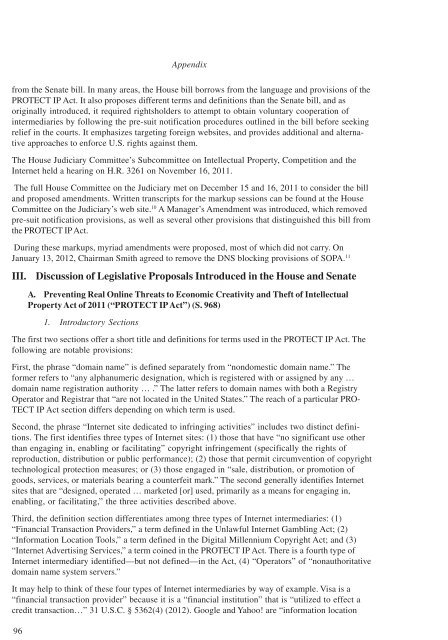1oz61wa
1oz61wa
1oz61wa
Create successful ePaper yourself
Turn your PDF publications into a flip-book with our unique Google optimized e-Paper software.
Appendix<br />
from the Senate bill. In many areas, the House bill borrows from the language and provisions of the<br />
PROTECT IP Act. It also proposes different terms and definitions than the Senate bill, and as<br />
originally introduced, it required rightsholders to attempt to obtain voluntary cooperation of<br />
intermediaries by following the pre-suit notification procedures outlined in the bill before seeking<br />
relief in the courts. It emphasizes targeting foreign websites, and provides additional and alternative<br />
approaches to enforce U.S. rights against them.<br />
The House Judiciary Committee’s Subcommittee on Intellectual Property, Competition and the<br />
Internet held a hearing on H.R. 3261 on November 16, 2011.<br />
The full House Committee on the Judiciary met on December 15 and 16, 2011 to consider the bill<br />
and proposed amendments. Written transcripts for the markup sessions can be found at the House<br />
Committee on the Judiciary’s web site. 10 A Manager’s Amendment was introduced, which removed<br />
pre-suit notification provisions, as well as several other provisions that distinguished this bill from<br />
the PROTECT IP Act.<br />
During these markups, myriad amendments were proposed, most of which did not carry. On<br />
January 13, 2012, Chairman Smith agreed to remove the DNS blocking provisions of SOPA. 11<br />
III.<br />
96<br />
Discussion of Legislative Proposals Introduced in the House and Senate<br />
A. Preventing Real Online Threats to Economic Creativity and Theft of Intellectual<br />
Property Act of 2011 (“PROTECT IP Act”) (S. 968)<br />
1. Introductory Sections<br />
The first two sections offer a short title and definitions for terms used in the PROTECT IP Act. The<br />
following are notable provisions:<br />
First, the phrase “domain name” is defined separately from “nondomestic domain name.” The<br />
former refers to “any alphanumeric designation, which is registered with or assigned by any …<br />
domain name registration authority … .” The latter refers to domain names with both a Registry<br />
Operator and Registrar that “are not located in the United States.” The reach of a particular PRO-<br />
TECT IP Act section differs depending on which term is used.<br />
Second, the phrase “Internet site dedicated to infringing activities” includes two distinct definitions.<br />
The first identifies three types of Internet sites: (1) those that have “no significant use other<br />
than engaging in, enabling or facilitating” copyright infringement (specifically the rights of<br />
reproduction, distribution or public performance); (2) those that permit circumvention of copyright<br />
technological protection measures; or (3) those engaged in “sale, distribution, or promotion of<br />
goods, services, or materials bearing a counterfeit mark.” The second generally identifies Internet<br />
sites that are “designed, operated … marketed [or] used, primarily as a means for engaging in,<br />
enabling, or facilitating,” the three activities described above.<br />
Third, the definition section differentiates among three types of Internet intermediaries: (1)<br />
“Financial Transaction Providers,” a term defined in the Unlawful Internet Gambling Act; (2)<br />
“Information Location Tools,” a term defined in the Digital Millennium Copyright Act; and (3)<br />
“Internet Advertising Services,” a term coined in the PROTECT IP Act. There is a fourth type of<br />
Internet intermediary identified—but not defined—in the Act, (4) “Operators” of “nonauthoritative<br />
domain name system servers.”<br />
It may help to think of these four types of Internet intermediaries by way of example. Visa is a<br />
“financial transaction provider” because it is a “financial institution” that is “utilized to effect a<br />
credit transaction…” 31 U.S.C. § 5362(4) (2012). Google and Yahoo! are “information location


